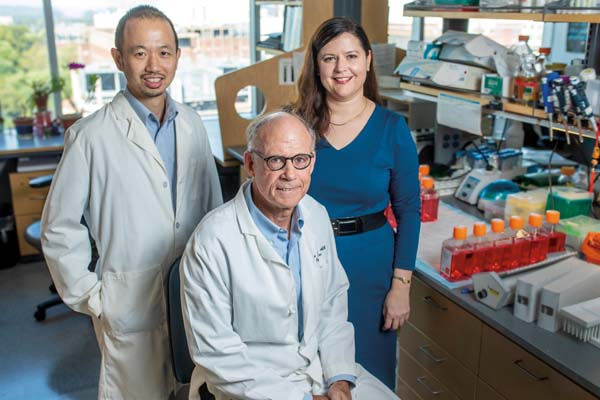Vanderbilt scientists at the vanguard
January 3, 2019 | Tom Wilemon

Ken Lau, PhD, left, Robert Coffey, MD, and Martha Shrubsole, PhD, are the principal investigators of an $11 million Cancer Moonshot grant initiative. Photo by John Russell.
The National Cancer Institute (NCI) has entrusted Vanderbilt scientists to lead several major research initiatives with recently awarded grants.
The largest of those awards is an $11 million Cancer Moonshot grant. A trans-institutional team of researchers from Vanderbilt University Medical Center (VUMC) and Vanderbilt University will utilize those funds to build a single-cell resolution atlas to map out the routes that benign colonic polyps take to progress to colorectal cancer, the third most common cancer among both men and women in the United States.
The work entails gathering thousands of data points per cell for each participant and then transforming that information into multidimensional geographic maps that enable scientists to study interactions among tumor cells, the microbiome and the immune microenvironment.
The principal investigators leading the Colon Molecular Atlas Project (Colon MAP) are Robert Coffey, MD, Ingram Professor of Cancer Research and director of the Epithelial Biology Center at VUMC; Ken Lau, PhD, assistant professor of Cell and Developmental Biology; and Martha Shrubsole, PhD, research professor of Medicine, Division of Epidemiology. They will lead an effort to identify which people are at greatest risk for colon cancer, discover cell characteristics that could lead to chemoprevention strategies and possibly recommend changes in screening and surveillance practices.
Others at VUMC involved with Colon MAP are Yu Shyr, PhD, Harold L. Moses Professor of Cancer Research; Qi Liu, PhD; Kay Washington, PhD, MD; Timothy Geiger, MD; Reid Ness, MD; Gregor Neuert, PhD; and Meghan O’Loughlin, program manager of the Epithelial Biology Center.

Michael Stone, PhD, Martin Egli, PhD and Carmelo Rizzo, PhD
Better utilizing chemotherapy
Another group of Vanderbilt scientists has been awarded $7.2 million over the next five years from the NCI to lead an initiative to better understand how a combination chemotherapy for breast cancer targets DNA.
Michael Stone, PhD, Carmelo Rizzo, PhD, and Martin Egli, PhD, will research the chemical biology of guanine alkylation that occurs with cyclophosphamide and doxorubicin, a treatment often referred to as AC chemotherapy regimen. The chemotherapies are mainstay treatments that have been in clinical use for decades, and there are well-established ideas of how they damage DNA of cancer cells. However, side effects can limit their effectiveness.
“It’s thought that cyclophosphamide and doxorubicin act on different targets independently, but we suspected that they can act synergistically,” said Rizzo, professor of Chemistry and Biochemistry. “We were able to come up with initial chemical evidence for this idea. The grant is based on this. If they do act synergistically, this could lead to new drugs designed to take advantage of this new mechanism.”

Jeremy Warner, MD
Data-driven cancer care
Jeremy Warner, MD, associate professor of Medicine and Biomedical Informatics, was awarded a $1 million grant to develop software that will help clinicians keep up with the increasing complexity of cancer care. The project, entitled Network Analysis for a Data-Driven Approach to Cancer Care, will provide physicians with a tool to interpret, organize and transform data into clinical decisions. The initiative will initially focus on two common cancers — breast cancer and multiple myeloma — but the software developed should be applicable to a wider variety of cancers.

Kimryn Rathmell, MD, PhD
Mentoring future leaders
Kimryn Rathmell, MD, PhD, Cornelius Abernathy Craig Professor of Medicine and director of the Division of Hematology and Oncology at Vanderbilt-Ingram Cancer Center, has received a $1.13 million grant to develop an intensively mentored training experience for clinical fellows. The Vanderbilt Integrated Molecular Oncology Research Training Program is an interdisciplinary postdoctoral program designed to develop a new generation of clinician-investigators.
“This grant helps us support budding young stars in medical oncology research,” Rathmell said.
She has assembled a team of mentors representing translational clinical research, tumor immunology, drug development and cancer informatics to guide the clinical fellows.

Jordan Berlin, MD and Charles Manning, PhD.
VU-PREDICT aims for novel imaging
Charles Manning, PhD, Ingram Professor of Cancer Research, and Jordan D. Berlin, MD, Ingram Professor of Cancer Research, have received a $3.2 million grant to develop a new co-clinical imaging resource entitled VU-PREDICT. The acronym stands for Vanderbilt University — PET imaging Resource to Enhance Delivery of Individualized Cancer Therapeutics.
One goal is to develop imaging technology so that the phenotypes of tumors — their visual presentations — can play a role alongside genomic assays based on RNA and DNA in matching patients with precision cancer medicine. Another goal is to develop quantitative imaging to evaluate mechanisms of response to new drug therapies. The research will focus on colorectal cancer.
“We’re working in the space of molecular imaging, so the resources that we are developing are innovative PET imaging readouts or biomarkers within the context of investigational radio-pharmaceuticals,” Manning said. “That’s a real strength we have at Vanderbilt: new ways to do molecular imaging, specifically positron emission tomography (PET) tracers. The tracers we are developing are at the investigational stage.”
